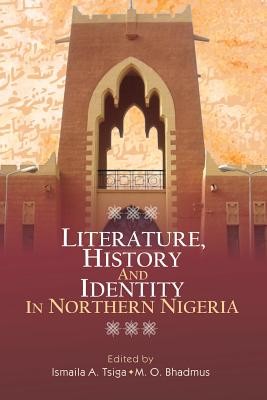
- We will send in 10–14 business days.
- Publisher: Safari Books Ltd
- Year: 2016
- Pages: 408
- ISBN-10: 9788431879
- ISBN-13: 9789788431879
- Format: 15.2 x 22.9 x 2.1 cm, minkšti viršeliai
- Language: English
- SAVE -10% with code: EXTRA
Literature, History and Identity in Northern Nigeria (e-book) (used book) | bookbook.eu
Reviews
Description
This unique collection of articles on literature in northern Nigeria is in three parts. Part one presents an overview of the running theme, in which Na'Allah explores the theoretical relationship between literature, history and identity in northern Nigeria, using the proverbial story of the blind man who holds a lamp while walking alone in the night. Similarly, Tsiga undertakes in a long bibliographical essay, a notable survey of the relationship between literature, history and identity in northern Nigeria, chronicling the development of life writing in the region dating back three hundred years. Part two focuses on the relationship between literature and history in northern Nigeria and begins with the article in which Illah investigates the theme. He uses the image of the bus to underscore the point he makes concerning the uniqueness of northern Nigerian literature, which continues its journey, even without a spare tyre. Equally in this part, Balogun discusses Yerima's Attahiru, Ameh Oboni: The Great as theatres of colonial resistance; just as Methuselah also examines the heroism celebrated in Ahmed Yerima's Attahiru. Adamu revisits the trans-fictional use of the Grimm Brothers' tale in the early published Hausa written narratives, while Yunusa and Malumfashi examine similar historical concerns in Abubakar Imam and Sa'adu Zungur, respectively. This part concludes with Garba assessing the transformation of the written Hausa prose narratives into radio broadcasts; while Abiodun examines in a historiographic survey the various forms and composition of Ilorin music.
EXTRA 10 % discount with code: EXTRA
The promotion ends in 21d.11:49:49
The discount code is valid when purchasing from 10 €. Discounts do not stack.
- Publisher: Safari Books Ltd
- Year: 2016
- Pages: 408
- ISBN-10: 9788431879
- ISBN-13: 9789788431879
- Format: 15.2 x 22.9 x 2.1 cm, minkšti viršeliai
- Language: English English
This unique collection of articles on literature in northern Nigeria is in three parts. Part one presents an overview of the running theme, in which Na'Allah explores the theoretical relationship between literature, history and identity in northern Nigeria, using the proverbial story of the blind man who holds a lamp while walking alone in the night. Similarly, Tsiga undertakes in a long bibliographical essay, a notable survey of the relationship between literature, history and identity in northern Nigeria, chronicling the development of life writing in the region dating back three hundred years. Part two focuses on the relationship between literature and history in northern Nigeria and begins with the article in which Illah investigates the theme. He uses the image of the bus to underscore the point he makes concerning the uniqueness of northern Nigerian literature, which continues its journey, even without a spare tyre. Equally in this part, Balogun discusses Yerima's Attahiru, Ameh Oboni: The Great as theatres of colonial resistance; just as Methuselah also examines the heroism celebrated in Ahmed Yerima's Attahiru. Adamu revisits the trans-fictional use of the Grimm Brothers' tale in the early published Hausa written narratives, while Yunusa and Malumfashi examine similar historical concerns in Abubakar Imam and Sa'adu Zungur, respectively. This part concludes with Garba assessing the transformation of the written Hausa prose narratives into radio broadcasts; while Abiodun examines in a historiographic survey the various forms and composition of Ilorin music.


Reviews